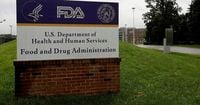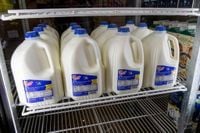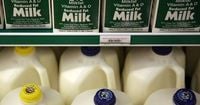In a move that has raised concerns about food safety across the nation, the U.S. Food and Drug Administration (FDA) has announced the suspension of its quality control program for testing fluid milk and other dairy products. This decision, effective April 21, 2025, comes amid significant staffing reductions within the Department of Health and Human Services (HHS), which oversees the FDA.
The suspension of this critical program, which ensures that dairy products meet the highest sanitary standards, has been attributed to a lack of resources and personnel. According to an internal email obtained by Reuters, the FDA's Moffett Center Proficiency Testing Laboratory can no longer provide the necessary laboratory support for proficiency testing and data analysis. This facility has played a vital role in maintaining the safety and quality of milk and dairy products consumed by millions of Americans.
As part of a broader initiative to shrink the federal workforce, the Trump administration has seen approximately 20,000 employees leave the HHS. This drastic reduction has prompted the FDA to halt its proficiency testing program for Grade “A” raw milk and other products, which is crucial for identifying potential contaminants such as Listeria, Salmonella, and E. coli.
Consumer advocates have expressed alarm over the implications of this suspension. Without regular quality testing, there is now a potential blind spot in the nation’s food safety net, especially concerning milk-borne illnesses. Contaminants can enter dairy products at various stages of production and packaging, posing serious health risks, particularly for vulnerable populations like children and the elderly.
Moreover, the FDA has also suspended efforts to improve testing for bird flu in milk and dairy products, a decision that raises further concerns as the country grapples with the threat of avian flu. The first reported cases of bird flu in dairy cows occurred in March 2024, and since then, over 1,000 dairy herds across 17 states have been infected. Alarmingly, of the 70 human cases of bird flu reported in the U.S. in the past year, 41 were linked to infected dairy cows.
Despite the FDA’s assurances that milk sold in grocery stores remains safe, experts warn that the rollback in testing could hinder the agency's ability to detect emerging health threats. "The FDA is actively evaluating alternative approaches for the upcoming fiscal year and will keep all participating laboratories informed as new information becomes available," the internal email noted. However, until full testing resumes, consumers are advised to stick to well-refrigerated, pasteurized dairy products and to pay close attention to expiration dates.
The FDA's decision to suspend its quality testing program is part of a larger trend of administrative cuts that have impacted various health and safety programs across the federal government. Critics argue that these cuts jeopardize public health and safety, particularly as the nation faces ongoing challenges related to foodborne illnesses and emerging pathogens.
As the situation unfolds, it remains to be seen how the FDA will address these critical gaps in food safety oversight. The agency's ability to ensure the safety of dairy products is now in question, and consumers are left to wonder about the implications for their health and well-being.
In summary, the suspension of the FDA's quality control program for dairy products marks a significant setback for food safety in the United States. With the ongoing staff reductions and the agency's focus on other initiatives, including controversial studies and program rollbacks, the path forward for maintaining the safety and quality of dairy products is fraught with uncertainty.






